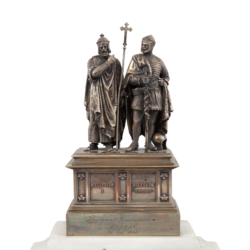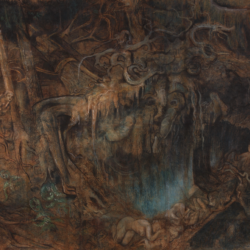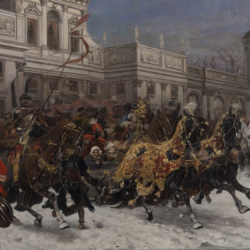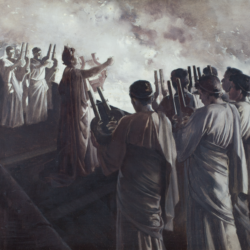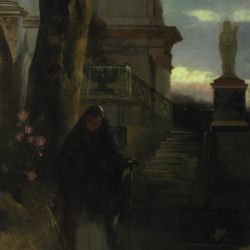
Is Henryk Sienkiewicz a political theologian?
A question could be asked whether the oeuvre of Sienkiewicz – who, as noted by Chmielowski, had no liking for philosophy[1] – could really constitute a suitable object for an analysis in the field of philosophy, or even religious studies, carried out on such a grand scale? The answer appears to be affirmative: yes, this approach seems promising for a variety of reasons, such as the writer’s vacillation between positivist and conservative trends, his aversion for doctrinarism, and the nature of the positivist movement itself (so essential for the modern change in Western perception and described by Voegelin as the most consistent representation of the “immanentist” tendency in 19th-century culture and civilization of the West). According to Bujnicki, Sienkiewicz repeatedly stated (especially in private correspondence) his dislike of any direct attempts to make him a social tribune. He hated being called on to take sides in the then ongoing ideological debate and resisted the pressure of the public opinion that tried to force him to perform the role he did not want or to support the views he was not confident about[2]. The decision to take up historical themes was motivated by the writer’s effort to escape what he saw as the spiritual stuntedness of his Polish contemporaries, the point mentioned in an often-cited quotation from his Mieszaniny literacko-artystyczne (Literary and artistic medley):
Of this life, we have had more than enough: it is making us tired, even bored; besides, we have lost our hopefulness, not to mention the desire to live. Let us at least allow literature to open up new worlds for us, with nothing stunted – and everything grand; nothing flat – and everything lofty; nothing diseased or dying – everything healthy, immortal; nothing old and decrepit – everything young and fresh.[3]
This syndrome of distancing oneself from the dictates of time and disengaging from society- imposed demands by seeking refuge in “ages long gone by” indicates the writer’s dissatisfaction with a wide range of aspects of the contemporary world (by no means limited to Poland being partitioned between enemy states, which in fact pushed Polish culture into a marginal position in Europe). Indeed, Sienkiewicz’s endeavor to bring back the past is very similar at its core to the nostalgia expressed by today’s critics of the post-Enlightenment model of Western civilization. Against the background of such “revisionist” longings, political theology stands out for the fact that it offers very precise diagnoses based on the current life of the society. In his From Enlightenment to Revolution, Voegelin thus characterizes the position of the Church as an institution that is both theological and political – and therefore responsible for translating the vision of the transcendent order into the social and political realities:
the spiritual institution was finally relegated to the private sphere, while the autonomous political institutions achieved the monopoly of publicity. This privatization of the spirit left the field open for a respiritualization of the public sphere from other sources, in the forms of nationalism; humanitarianism; economism both liberal and socialist; biologism; and psychologism. […] More fateful was the spiritual devastation wrought by the widespread conviction that the rational-scientific approach could be a substitute for the spiritual integration of personality.[4]
This diagnosis gathers together the key motifs for Sienkiewicz’s “conversion” to conservatism and the contradictions emerging in his artistic biography: keeping away from any doctrines, voicing anticlerical views (especially in the private letters written during his trip to America), displaying an aversion to the communities around him (both positivists and conservatives), expressing a desire to be transported into a world that would allow the human soul to regain its “eschatological” dimension and its fundamental freedom of choice between good and evil. There are strong indications that the underlying cause of self-contradictions and inconsistencies (which can undeniably be found in Sienkiewicz’s attitude) lay largely not in his personal motives but in the essential dilemmas of the time[5]. In light of Voegelin’s thought, an alternative interpretation to the much-commented fact that the author of the Trilogy never actually went beyond the positivist mindset also appears. It is not enough, I believe, to state that the writer remained under the influence of the generally understood positivist cultural formation throughout his writing career; one should also realize the extent to which the ideological conditioning of the time (or rather: theological and political conditioning, because of the involvement of the unconscious which cannot be subject to reasoning) made it impossible to freely express any “eschatological” yearnings. Similarly, as claimed by Voegelin, Enlightenment trends reflected in the thought of Helvetius constitute:
a classical instance of the destruction of the integral human person by positing as normal the disorder of the person while denying to man the remedial powers which might restore the order. […] Society has become a totally closed universe with an immanent process of salvation.[6]
The American historian of ideas describes here a model of European society close to the peak of the modern era, which could be associated with Jeremy Bentham’s Panopticon with its impenetrable walls and no “windows” for the prisoner to discern the transcendent reality.
In his extensive and multi-layered series Order and History, Voegelin calls this solution the “Gnostic order,” or rather the “Gnostic deformation” in the perception of the Cosmos–Logos, as substantially independent of man (who is merely its non-autonomous creation). It is in this manner, continues Voegelin, that modernity dispels the notion of the fear of God, so characteristic of both monotheistic and polytheistic religious epiphanies of order; it rejects the idea that the transcendent sphere may be free from physis, and that – to draw on Plato and his predecessors – proper measures should be taken to separate the human from the divine.
Thus, Sienkiewicz’s perspicacity appears to consist in the fact that he recognized the need for a shift towards conservatism, which would in a way rectify the major error committed by modern societies in the fundamental, critical stage of defining the premises for the order. It is worth noting here that, thus perceived, conservatism does not rule out adopting individual elements of the positivist mindset: only an objective, honest appraisal of one’s situation can make it possible to readjust the view of reality to correct proportions, so that a single, separate “entity” is no longer deified in a manner typical for the Enlightenment shift.
Przypisy
- Piotr Chmielowski, Charakterystyki literackie pisarzów polskich [Literary portraits of Polish writers], vol. 9, Henryk Sienkiewicz, Złoczów [n.d.]
- In a letter to his friend, journalist Julian Horain, Sienkiewicz wrote, “If you only knew the extent of my hate and scorn for that strumpet we commonly call the public opinion, and the bold readiness I have always felt and will feel to spit in its face, you would truly envy my frame of mind and courage” (H. Sienkiewicz, Listy [Letters], edited by M. Bokszczanin, vol. 1, part 2, Warsaw 1977, p. 372; trans. J. M.).
- H. Sienkiewicz, “Mieszaniny literacko-artystyczne” [Literary and artistic medley], in H. Sienkiewicz, Dzieła [Collected works], edited by J. Krzyżanowski, vol. 50, Warsaw 1950, p. 93; trans. J. M.
- E. Voegelin, From Enlightenment to Revolution, edited by J. H. Hallowell, Durham 1975, pp. 20–21.
- In the already-cited article by Tadeusz Bujnicki, the scholar argues: “So, was Sienkiewicz’s affiliation to the Conservative camp a merely pragmatic act, a symptom of his opportunism? To some degree, this statement is true. However, to reduce the psychological make-up of the author of the Trilogy in this way would be a serious oversimplification. It should be emphasized that Sienkiewicz’s literature often combines ideas that seem to be contradictory: opposite trends are juxtaposed within one mind in a dialogue of differing worldviews” (T. Bujnicki, op. cit., p. 71; trans. J. M.). Sienkiewicz did seem to have a foot in both camps discourse-wise, with his contributions provoking accusations of opportunism; however, his reiterated “desire for space to let the soul grow” points to other reasons – the ones indicated by Voegelin in his studies of the modern era.
- E. Voegelin, op. cit., pp. 50–51.


